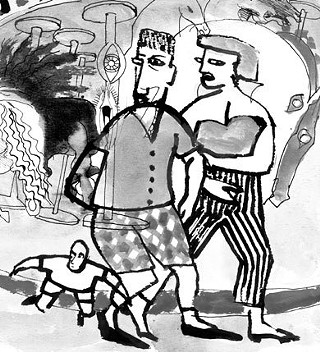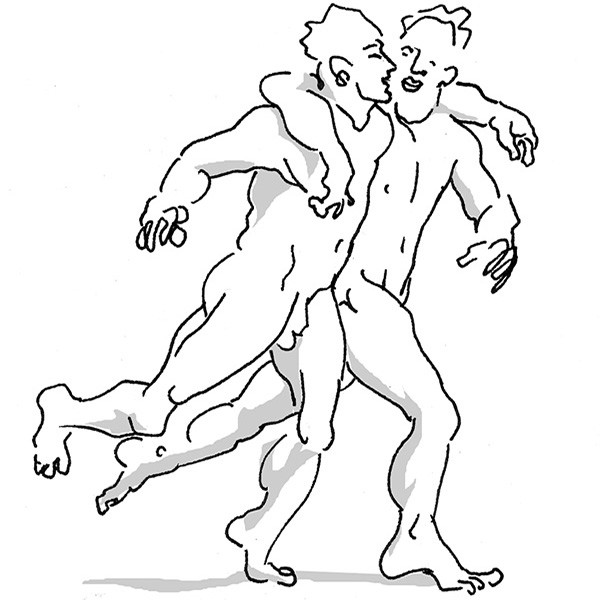What makes you feel good, feel alive? We all have a sense that feeling alive is synonymous with feeling good. Everyone wants to feel good. But when it comes right down to it, feeling good means little more for most of us than wishing to be entertained. When your work day is done, all you want to do is kick back and turn on the CD player because a good strong dose of music is going to make you feel alive again. Or maybe it's movies, or TV, or the telephone, or the Internet that gives you that feeling. What did they used to call TV? The plug-in drug? That was before all the plug-in drugs we now have at our disposal. Or, should I say, the plug-ins that have us at their disposal?
It's not that these things are somehow evil. The troublesome thing about how we feel good about ourselves is how dependent on externals we become, how passive our state is. And this passivity isn't limited to mechanical things, though it sometimes looks that way. We can be just as dependent on "natural" things - something as natural as the weather.
Did you ever notice how some people's mood, their frame of mind, is entirely dependent on the weather? If the sun isn't shining or it's raining or it's cold or hot or humid or windy, they're not happy and everything is wrong. They don't happen to like the conditions that life throws at them, and how they feel about those conditions is all that's important to them. It's all about what's happening outside and how they feel about it. The weather affects their mood, their ambitions for the day, their willingness to do anything. It's no different than being hooked on DVDs at night. They're living lives that are inside-out. To use a theatrical metaphor, they're mistaking the scenery of their lives - the externals - for the reality of what life is really about.
You want to know what life is really about? It's simple. It's about action, about being aware enough of yourself and your surroundings that you know what action to take. Shakespeare was right on the money when he said all the world's a stage. And he wasn't just speaking metaphorically either.
When an actor steps out on stage, what he's doing isn't dependent in any but the slightest way with the scenery. It's something he should beware of bumping into. The scenery is there to support what he's doing, to reflect his actions and the playwright's intentions for the benefit of someone else.
Maybe in the beginning, if you want to play Hamlet, you'll want the costumes and the fog and poor old Yorick's skull to ponder and talk to and you won't cut a line of the dialog, even if that means the play goes on for four hours and bores the audience to tears. But as you become more skilled in the theater, as you see more of what's possible, maybe you become like director Peter Brook, who once staged Hamlet on a bare stage, in a production that lasted barely 90 minutes.
Brook recognizes that a good actor can act anywhere, regardless of scenery, because good actors aren't dependent on the externals, they're aware of and dependent on an inner activity that impels their words and actions.
That's one of the great things about the stage - it's a wonderful illustration of how to live. A person needs to learn how to act in life, how to take action, exactly as an actor does on stage. That is, you need to listen, to pay attention, to the other actors. If you don't do that, you know what happens? You miss your cue. You don't remember where you are. And you go crashing into the scenery, or mistaking it for something important.
Now admittedly, not many of us think that life is filled with cues. We don't recognize the truth of Shakespeare's words. Is it any wonder that our lives are such dreadful melodramas? Imagine a play in which none of the actors pay any attention to the other people on stage. They walk around, believing only in what they call "their reality." Not only is such a production boring, it's dangerous. If you don't know you're on stage, you're likely to fall off it and break your leg, or worse.
Everything in a play is about now, not about later. If you've ever performed in one, you know there's no room on stage for you to think about tomorrow, or even the next line, the next moment, because now is so encompassing. You have to be right there in the moment, and in the next one and the next one. You can't live in your own world on stage. You're in a world that's been created for certain reasons, so you have to be aware of everything onstage, you have to pay attention to the moment. If you're playing Col. Mustard and you expect to find the lead pipe in the drawer of the dining room bureau, you've got to be ready to respond if you discover the prop guy forgot to put it there.
There's a famous story about a play that's come to a dramatic high point in which one actor is about to kill another. The killer reaches for a gun, pulls the trigger, but nothing happens. So he flings the gun away, grabs a knife from the kitchen table and as he raises it to plunge into the heart of his enemy, the blade falls out of the handle and clatters to the ground. The actor throws the handle to the ground and shouts "Now I kill you with my poison ring!" and he punches the other actor in the face. What else can you say to such readiness but "bravo!"?
Our modern understanding of theater has even been inverted. In more enlightened times, theater was used for the purpose of waking people - the actors - up, through their participation in an arranged or created life. The actual presentation of the play to an audience was secondary. In most of what we call theater today, the audience defines everything - theater's all about giving the audience what it wants. It's another example of how passive our lives have become. We expect to be catered to, we keep demanding, applauding, and paying for the bogus Broadway version of things.
If you've ever been lucky enough to witness a play where the actors are alive to the moment, you know what I'm talking about. They may be wearing togas or army uniforms or overalls, the scenery may be elaborate or simple, it doesn't matter - you feel part of the world they're inhabiting. They've brought themselves into the moment - nothing else exists for them, they're alert and present to everyone else on stage and in those moments, their world becomes your world and you realize, you feel, the power of just being there, the power not merely of being entertained but of being transported out of the small, passive world you've grown accustomed to and into the great world we all share.
If you've ever had that experience, whether as an actor or as a member of the audience, you know what it is to be alive, and you have some inkling of what it takes to get to there.














